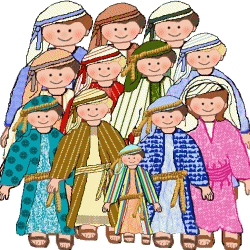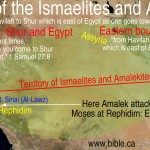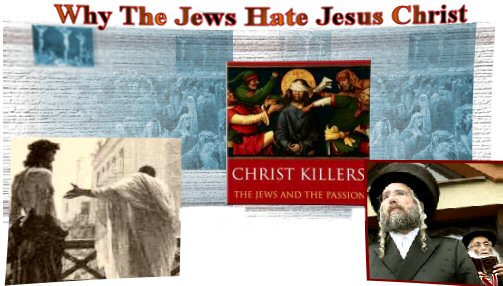[Reposting at a time when abortion, throwaway unborn fetuses and unwanted born babies have become connected with “Women’s Rights”. Whaaatttt? Where? In a country where women are supposedly so liberated, they can be as sexually active as they choose to be, in and out of marriage, because contraceptives are accessible and aplenty, guess where? If that’s so, then why can’t women just resort to contraception in this day and age when they are given control over their bodies, at least in societies that recognize that right. How far have we come from Biblical times! The title of this post is exactly what this Genesis chapter is about:

Image from asinusspinasmasticans.wordpress.com
One. Yaakov’s sister-wives try to out-baby each other going to the point of using their maidservants as surrogate mothers. What is it about having babies that obsess these rival sister-wives? It couldn’t possibly be a scramble to fulfill prophecy; it must simply be that the culture in those days regarded female fertility as a ‘super-plus’ so that women themselves thought their be-all and end-all was to be prolific baby machines and produce children non-stop. No wonder barrenness or infertility had to be the bane of the wives of Israel’s patriarchs, if only for Israel’s God to intervene and open the womb so that the promised child could be evident as a miraculously conceived and born.
Two. Yaakov and Laban . . . 2 wits . . . outwitters . . . nitwits. This chapter says it all.
Unbracketed commentary is from Pentateuch and Haftorahs, ed. Dr. J.H.Hertz; translation is Everett Fox, The Five Books of Moses with commentary in “EF”; additional commentary from “RA” Robert Alter.—Admin1.]
————————————————-
Genesis/Bereshith 30
1 Now when Rahel saw that she could not bear (children) to Yaakov, Rahel envied her sister. She said to Yaakov: Come-now, (give) me children! If not, I will die!
else I die. Of grief and shame.
[RA] Give me sons, for if you don’t I’m a dead woman! It is a general principle of biblical narrative that a character’s first recorded speech has particular defining force as characterization. Surprisingly, although Rachel has been part of the story for more than a decade of narrated time, this is the first piece of dialogue assigned to her. It is a sudden revelation of her simmering frustration and her impulsivity: in fact, she speaks with an impetuousness reminiscent of her brother-in-law Esau, who also announced to Jacob that he was on the point of death if Jacob did not immediately give him what he wanted.
2 Yaakov’s anger flared up against Rahel, he said: Am I in place of God, who has denied you fruit of the body?am I in God’s stead? In His hands alone are the issues of life and death.
[EF] Yaakov’s anger flared up: The usual biblical expression for anger; lit. Yaakov’s nostril(s) flamed.”
[RA] Am I instead of God. Through Jacob’s words, the writer shrewdly invokes a fateful deflection of the anunciation type-scene. According to the convention of the annunciation story, the barren wife should go to an oracle or be visited by a divine messenger or a man of God to be told that she will give birth to a son. Rachel instead importunes her husband, who properly responds that he cannot play the role of God in the bestowal of fertility, or in the annunciation narrative. Rachel is then forced to fall back on the strategy of surrogate maternity, like Sarai with Hagar. One should note that she demands “sons,” not a son. Eventually, she will have two sons, but will die in giving birth to the second one. Perhaps her rash words here, “Give me sons, for if you don’t, I’m a dead woman,” are meant to foreshadow her premature death.
3 She said: Here is my slave-girl Bilha; come in to her, so that she may give birth upon my knees, so that I too may be built-up-with-sons through her.behold my maid. Rachel resorts to the same expedient as Sarah.
upon my knees. A figurative expression denoting the adoption of a child.
be builded up. As in XVI,2. She can thus have ‘sons whom I may nurse and rear as my own’ (Targum).
[EF] give birth upon my knees: An idiom for legal adoption (here, by Rahel).
[RA] give birth on my knees. Placing the newborn on someone’s knees was a gesture of adoption.
built up through her. As with Sarai in chapter 16, the verb ‘ibaneh, puns on ben, “son.”
5 Bilha became pregnant and bore Yaakov a son.
6 Rahel said:
judged me. God has decided in her favour.
[RA] God granted my cause. The verb dan suggests vindication of a legal plea, and is offered as the etymology of the name Dan.
8 Rahel said:
mighty wrestlings. lit. ‘wrestlings of God’, where ‘of God’ is merely the Heb. idiom for the superlative.
[RA] grapplings. The Hebrew naftulim plays on Napthtali. It is noteworthy that Rachel chooses an image of wrestling for her relationship with her sister that marks a correspondence to the relationship of Jacob, the “heel-grabber,” with his older sibling.
9. When Leah saw that she had ceased bearing, she took Zilpah her handmaid, and gave her to Ya’aqob as a wife. 10. And Zilpah the handmaid of Leah bore Ya’aqob a son. 11. And Leah said: Fortunate and she called his name Gad.Fortune is come. This translation is according to the traditional Reading, the Kre.
[RA] Good luck has come. The translation follows a long-established practice in separating the enigmatic single word of the Masoretic text, bagad, into ba’gad.
12 And Zilpa, Lea’s maid, bore a second son to Yaakov.13 Lea said: What happiness! For women will deem me happy. So she called his name: Asher/Happiness.
[EF] What happiness: Others use “Happy am I!”
[RA] What good fortune! For the girls have acclaimed me fortunate. Asher’s name is derived from ‘osher, “good fortune,” and the entire naming is thus closely parallel to the naming of Gad. This noun ‘osher produces a common biblical verb, ‘isher, the basic meaning of which is to call out to a lucky person, ‘ashrei, “happy is he” (or, here, “happy is she”).
14 Now Re’uven went in the days of the wheat-harvest and found some love-apples in the field, and brought them to Lea his mother. Rahel said to Lea: Pray give me (some) of your son’s love-apples!mandrakes. Or, as the RV Margin translates, ‘love-apples.’ The fruit is of the size of a large plum, quite round, yellow and full of soft pulp. The fruit is still considered in the East as a love-charm. This explains Rachel’s anxiety to obtain it.
[EF] love-apples: Heb. dada’im; a plant believed to have aphrodisiac powers. Others use “mandrakes.”
[RA] mandrakes. As in other, later cultures, these plants with tomato-shaped fruit were used for medicinal purposes and were thought to be aphrodisiac, and also to have the virtue of promoting fertility, which seems to be what Rachel has in mind. The aphrodisiac association is reinforced in the Hebrew by a similarity of sound (exploited in the Song of Songs) between duda’im, “mandrakes,” and dodim, “lovemaking.”

Image from rastafarirenaissance.wordpress.com
thou hast taken away. By holding first place in his affections.
[EF] taking away: The theme of “taking,” so prominent to Chap. 27, returns, in the context of sibling rivalry again.
[RA] Is it not enough that you have taken my husband. The narrator has mentioned Rachel’s jealousy of Leah, and Rachel has referred to “grappling” with her sister, but this is the first actual dialogue between the sisters. It vividly etches the bitterness between the two, on the part of the unloved Leah as well as of the barren Rachel. In still another correspondence with the story of Jacob and Esau, one sibling barters a privilege for a plant product, though here the one who sells off the privilege is the younger, not the elder.
16 So when Yaakov came home from the fields in the evening, Lea went out to meet him and said: You must come in to me, for I have hired, yes, hired you for my son’s love-apples. So he lay with her that night.[EF] With me you will come to bed . . . And he lay with her that night. In his transactions with these two imperious, embittered women, Jacob seems chiefly acquiescent, perhaps resigned. When Rachel instructs him to consort with her slavegirl, he immediately complies as he does here when Leah tells him it is she who is to share his bed this night. In neither instance is there any report of response on his part in dialogue. The fact that Leah uses his particular idiom for sexual intercourse (literally, “to me you will come”), ordinarily used for intercourse with a woman the man has not previously enjoyed, is a strong indication that Jacob has been sexually boycotting Leah. That could be precisely what she is referring to when she says to Rachel, “You have taken my husband.”
17 And God hearkened to Lea, so that she became pregnant and bore Yaakov a fifth son.18 Lea said: God has given me my hired-wages, because I gave my maid to my husband! So she called his name: Yissakhar/There-is-hire.
[EF] hired-wages: “Wages” recurs as a theme throughout this part of the Yaakov cycle (Fokkelman). It is perhaps a veiled portrayal of the events of Yaakov’s adulthood as “payment” for what he did to his brother. Yissakhar: Trad. English “Issachar.”
[RA] God has given my wages. In this case, as again with the birth of Joseph, there is a double pun in the naming-speech. The word for “wages” (or, “reward”) is sakhar, which also means a fee paid for hiring something. Leah uses this same root when she tells Jacob (verse 16) that she has “clearly hired” him (sakhor sekhartikha). Thus Issachar’s name is derived from both the circumstances of his conception and his mother’s sense of receiving a reward in his birth. All this suggests that the naming etymologies may not have figured so literally in the ancient Hebrew imagination as moderns tend to imagine: the name is taken as a trigger of sound associations, releasing not absolute meaning but possible meaning, and in some instances, a cluster of complementary or even contradictory meanings.
19 Once again Lea became pregnant, and she bore a sixth son to Yaakov.20 Lea said: God has presented me with a good present, this time my husband will prize me- for I have borne him six sons! So she called his name: Zevulun/Prince.
[EF] this time my husband will prize me: Lea’s six pregnancies and birthings are bracketed by this verse and 29:32. “Now my husband will love me.” Zevulun: Trad. English “Zebulun.”
[RA] a goodly gift . . . my husband will exalt me. The naming of Zebulun illustrates how free the phonetic associations can be in the naming-speeches. Zebulun and zebed (“gift”) share only the first two consonants. The verb for “exalt” (this meaning is no more than an educated guess), zabal, then exhibits a fuller phonetic correspondence to Zebulun and evidently represents an alternative etymology of the name.
This time my husband will exalt me. Having borne Jacob half a dozen sons, half of the sanctified tribal grouping of twelve, Leah indulges one last time in the poignant illusion that her husband will now love her.
21 Afterward she bore a daughter, and called her name Dina.and she called her name Dinah. The absence of a naming etymology for Dinah is by no means an indication, as has often been claimed, that this verse derives from a different source. There is no naming-speech for Dinah because she is a daughter and will not be the eponymous founder of a tribe.
22 But God kept Rahel in mind, God hearkened to her and opened her womb,[RA] 22-23. After the long years of frustrated hopes and prayers (the latter intimated by God’s “hearing” Rachel), the gift of fertility is represented in a rapid-fire chain of uninterrupted verbs: remembered, heard, opened, conceived, bore.
my reproach. Of being left childless. The Heb. name has the double sense of ‘taking away’ (the reproach) and of ‘adding’ (to her another son).
[EF] 23-24 removed . . . add: Yosef’s naming prefigures his destiny as a son lost and found.
[RA] taken away my shame. “Taken away,” ‘asaf, is proposed as an etymology of Yosef, Joseph.

Image from rastafarirenaissance.wordpress.com
24-43. JACOB’S WAGES
24 So she called his name: Yosef, saying: May YHVH add/yosef another son to me![EF] Yosef:Trad. English “Joseph.”
[RA] May the LORD add me another son. “Add,” yosef, Rachel’s second etymology, is a perfect homonym in Hebrew for Joseph (and hence the odd name used among American Puritans, Increase). Leah’s double etymology for Issachar had referred in sequence to conception and birth. Rachel’s double etymology refers to birth and, prospectively to a future son. She remains true to the character of her initial speech to Jacob, where she demanded of him not a son but sons. She will be granted the second son she seeks, but at the cost of her life.
25 Now it was, once Rahel had borne Yosef, that Yaakov said to Lavan: Send me free, that I may go back to my place, to my land,send me away. It would thus seem that the fourteen years’ service terminated shortly after Joseph’s birth.
give me my wives. In spite of Jacob’s completed service the wives and children were in the legal power of Laban, who could refuse to hand them over to Jacob; see XXXI,43.
[EF] give over my wives and my children: In the law of the region, slaves did not retain control of their families. Does this suggest something about Yaakov’s treatment by Lavan? (Speiser).
[RA] for whom I have served you . . . for you know the service that I have done you. Jacob’s speech repeatedly insists on the service (‘avodah) he has performed for Laban, the same word used in the agreement about the double bride-price. He has worked seven years before marrying the two sisters and, given Leah’s seven childbirths with a few years’ hiatus between the fourth and fifth sons, several years beyond the second seven he owed Laban as Rachel’s bride-price.
found favour in thine eyes. Laban wishes to retain Jacob.
[EF] Pray, if I have found: Or, “May I now find.” I have become wealthy,/ and YHAH . . .: Some interpret this as “I have divined that YHWH . . .”
[RA] If, pray, I have found favor in your eyes. This formula of deference is normally followed by a request. If the text is reliable here, Laban begins with the deferential flourish and then, having mentioned how he has been blessed through Jacob, lets his voice trail off. A second formula for the introduction of speech (“and he said”) is inserted, and only then does he proceed to his request: “Name me your wages.” Could the thought of the prosperity he has enjoyed through Jacob’s supervision of his flocks lead to this self-interruption, a kind of hesitation before he asks Jacob to name the separation pay that he knows he owes his nephew?
I have prospered. Everywhere else in the Bible, the verb niesh means “to divine,” but that makes little sense here, and so there is plausibility in the proposal of comparative semiticists that this particular usage reflects an Akkadian cognate meaning “to prosper.”
29 He said to him:
with me. Under my care.
30 For you had but few before me, and they have since burst out into a multitude. Thus has YHVH blessed you at my every step! But now, when may I too do something for my household?withersoever I turned. lit. ‘at my foot’, i.e. either ‘at every step I took’; or (so the Midrash), ‘at my coming’ into thy house.
provide for mine own house. His wives and children now belong to him, and he feels the responsibility of making provision for their future.

Image from www.essex1.com
Jacob, still feeling sore at the way he had been outwitted by Laban over the matter of Rachel, determines to put to good use his exceptional knowledge and skill as a shepherd.
[RA] You need give me nothing. In a classic bargainer’s ploy, Jacob begins by making it sound as though Laban will owe him nothing. As he goes on to name his terms, it seems as though he is asking for next to nothing: most sheep are white, not dark-colored; most goats are black, not speckled; and, Laban, by first removing all the animals with the recessive traits from the flocks, will appear to have reduced to nil Jacob’s chances of acquiring any substantial number of livestock. One should note that, as in the stealing of the blessing, Jacob is embarked on a plan of deception that involves goats.
32 Let me go over your whole flock today removing from there every speckled and dappled head; and every dark head among the lambs, and each dappled and speckled-one among the goats-they shall be my wagesThe sheep in Syria are white and the goats black. Jacob asks as his wages the sheep which are not white and the goats which are not black. Laban considers the request fair and, to him, profitable.
of such shall be my hire. These, and the lambs and kids subsequently born with the same peculiarity, should belong to him.
[EF] Let me go: Some read “Go.” every speckled . . . : This would appeal to Lavan, since such animals would be in the minority.
33 And may my honesty plead for me on a future day: when you come-to-check my wages (that are) before you, whatever is not speckled or dappled among the goats, or dark among the lambs, it will be as though stolen by me.righteousness. ‘In this way my honesty will tell, when you come to cast your eye over my share; any goat in my lot that is not speckled or spotted, any sheep that is not black, you may consider to have been stolen’ (Moffatt).
The compact is all in Laban’s favour; but, crafty, selfish and grasping, he starts to circumvent Jacob, by preventing the increase of any speckled or brown cattle.
35 And on that (very) day he removed the streaked and dappled he-goats
[EF] white: Heb. lavan. Also the word “poplar” in v. 37 is a play on Lvan (livne). The conniving father-in-law is tricked with words resembling his own name.
[RA] 35-36. And he removed . . . the spotted and speckled . . .And he put three days’ journey between himself and Jacob. Laban, taking Jacob at his word, seeks to eliminate any possibility of crossbreeding between the unicolored animals and the others by putting a long distance between the spotted ones and the main herds.
that had white on it. The Hebrew “white,” lavan, is identical with the name Laban. As Nahum Sarna puts it, Jacob is beating Laban at his own game—or, with his own name-color.
36 Then he put a three-days’ journey between himself and Yaakov. Now Yaakov was tending Lavan’s remaining flock
three days’ journey. A phrase denoting a considerable distance; Exod. III,18.
37 Yaakov took himself rods from moist poplar, almond, and plane treesstreaks. Jacob devises three plans for the purpose of frustrating Laban. He placed streaked rods over against the ewes. The sight of these rods would affect the colouring of the young about to be born. ‘He did not resort tot his device the first year, and thereafter only in connection with his own flock; otherwise it would have been flagrant dishonesty’ (Kimchi).
38 then he presented the rods that he had peeled in the gutters, in the water troughs where the flock would come to drink, in front of the flock. Now they would be in heat as they came to drink;[RA] he stood the rods he had peeled in the troughs . . . opposite the flocks, which went into heat. The mechanism of Jacob’s ingenious scheme has long perplexed commentators. At least on the surface, it appears to involve the age-old belief that sensory impressions at the moment of conception affect the embryo—here, the peeled rods, with their strips of white against the dark bark, would impart the trait of spots or brindle markings to the offspring conceived. (The same effect would then be achieved for the sheep by making them face the flocks of speckled goats during their own mating time.) Yehuda Feliks, an authority on biblical flora and fauna, has proposed that the peeled rods are only a dodge, a gesture to popular belief, while Jacob is actually practicing sound principles of animal breeding. Using a Mendelian table, Feliks argues that the recessive traits would have shown up in 25 percent of the animals born in the first breeding season, 12.5 percent in the second season, and 6.25 percent in the third season. Jacob is, moreover, careful to encourage the breeding only of the more vigorous animals, which, according to Feliks, would be more likely to be heterozygotes, bearing the recessive genes. It is noteworthy that Jacob makes no mention of the peeled rods when in the next chapter he tells his wives how he acquired the flocks.
39 thus the flock came to be in heat by the rods, and the flock bore streaked, speckled, and dappled (young).
Image from spaceghetto.us
The second plan was, Jacob separates the newly-born spotted lambs and kids from the rest of the flock, but so arranges them that there should be a further tendency to bear spotted young.
[EF] gave position: Following the interpretation of Fokkelman.
41 So it was that whenever the robust flock-animals were in heat, Yaakov would put the rods in sight of the flock-animals, in the gutters, to make them be in heat next to the rods.He arranges to secure for his own share the young of the strongest animals.
42 But when the flock-animals were feeble, he would not put them there. And so it was that the feeble-ones became Lavan’s, and the robust-ones, Yaakov’s.43 The man burst-forth-with-wealth exceedingly, yes, exceedingly, he came to have many flock-animals and maids and servants, and camels and donkeys
[EF] he came to have many flock-animals: Like his father (26:14) and grandfather (12:16).






























